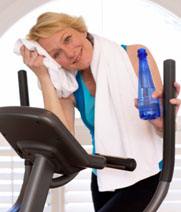- MENU
- HOME
- SEARCH
- WORLD
- MAIN
- AFRICA
- ASIA
- BALKANS
- EUROPE
- LATIN AMERICA
- MIDDLE EAST
- United Kingdom
- United States
- Argentina
- Australia
- Austria
- Benelux
- Brazil
- Canada
- China
- France
- Germany
- Greece
- Hungary
- India
- Indonesia
- Ireland
- Israel
- Italy
- Japan
- Korea
- Mexico
- New Zealand
- Pakistan
- Philippines
- Poland
- Russia
- South Africa
- Spain
- Taiwan
- Turkey
- USA
- BUSINESS
- WEALTH
- STOCKS
- TECH
- HEALTH
- LIFESTYLE
- ENTERTAINMENT
- SPORTS
- RSS
- iHaveNet.com: Health
Stacey Colino - Live Right Live Well

You've just had a hard-core tryst with a stair-climber. The machine informs you that you've burned 250 calories. Is it telling the truth?
Maybe not! Researchers are discovering hidden factors that can cause exercise machines to report less-than-accurate results.
In fact, the margin for error can be as high as 30 percent, according to Michele Olson, Ph.D., a professor of exercise science at Auburn University in Montgomery, Ala., who has conducted research on the subject.
Why Machines Make Mistakes
The three most common reasons for a machine to give faulty information include:
They use a reference weight
If the machine doesn't require you to enter your body weight, that's a tip-off that the calorie-burning calculations may be questionable. Many machines use a "reference weight, such as 75 kilograms or 154 pounds," says Olson, "which is common [practice] in science."
It doesn't account for body composition
Even if the machine does ask you to enter your weight, it can't account for how much muscle you have, compared to fat -- and "the relative ratio of a person's lean tissue [muscle mass] to fat tissue will have a definite impact on how many calories that person burns during exercise," says Cedric Bryant, Ph.D., chief science officer for the American Council on Exercise. This is because, pound for pound, muscle burns more calories than body fat. So a 150-pound person with 20 percent body fat will burn more calories during a workout than someone who weighs 150 pounds and has 30 percent body fat.
It doesn't account for individual technique
"Another factor that influences the accuracy of the caloric feedback is the exercise technique employed by the person using it," says Bryant. If you lean too heavily on the handrails while using a treadmill, elliptical or stair-climber, you'll be "off-loading" some of your body weight onto the machine, which reduces how hard you have to work. "It has been estimated that for every ten pounds that you off-load, the caloric expenditure is reduced by 7 percent," Bryant says.
Maximizing Your Workout
So what should you do with calorie-burning reports, and how can you make sure you get the most out of an exercise machine?
Don't take the results at face value
Instead, use them to "compare one workout to the next, especially if you're working out on the same machine," suggests exercise physiologist Richard Cotton, national director of certification for the American College of Sports Medicine.
Subtract 20 percent from the reported calories
This will compensate for any error the machine makes, advises Olson. And if it turns out the machine was accurate, you'll have burned more calories than you thought!
Always use proper form
Stand tall, with your head held high, back straight (don't slouch!) but not rigid. Avoid leaning on the handrails. If you need to touch the bar, keep it light, says Cotton, but "try to get the confidence not to hold on."
Try interval training
"The human body works to adapt, and as you become more efficient at doing a particular activity, your potential for burning calories decreases," Cotton explains. By alternating between bursts of higher-intensity and lower-intensity exercise, you can trick your body into burning calories and improving conditioning at a faster overall rate. So after warming up, push yourself nearly as hard as you can -- by increasing the pace, incline or resistance level -- for three minutes, then drop down to a more comfortable pace or intensity for three minutes. Repeat this pattern throughout the workout, then end with a cooldown.
Avoid the temptation to splurge
When you see an actual number of calories (supposedly) burned, it can be especially difficult to resist a sweet snack or a second helping at dinner. After all, it feels like you know exactly how many calories you have to spare. Don't do it! You could end up consuming more calories than you burned -- especially if the readout wasn't accurate!
Stacey Colino has written for The Washington Post health section and many national magazines, including Newsweek, Real Simple, Woman's Day, Self, Marie Claire, Cosmopolitan, Glamour, Parenting, Sports Illustrated and Ladies' Home Journal
Copyright © All rights reserved.
AGING | ALTERNATIVE | AILMENTS | DRUGS | FITNESS | GENETICS | CHILDREN'S | MEN'S | WOMEN'S
Health - Fitness: Do Exercise Machines Lie?